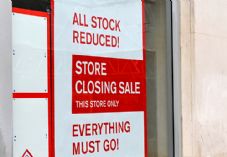UK DIY News
£22bn Cost Of Lockdown To Retailers

2020 was the worst year on record for retail sales growth with in-store non-food declining by 24% compared with 2019. These results have also been reflected in footfall, which was down over 40% in 2020. After some retailers embraced rapid increases in demand, others found their doors closed for the third time at the end of last year.
The BRC calculates that the three lockdowns cost ‘non-food’ stores – mainly ‘non-essential’ retail – an estimated £22bn in lost sales. Furthermore, tighter restrictions in the crucial run-up to Christmas hampered retailers’ ability to generate much-needed turnover, which would have helped power their recovery in 2021. Retailers contributed £17bn in business taxes in 2019, collecting a further £46bn in VAT. A strong retail sector is essential to ensuring these future revenue streams for Government and local councils, vital for supporting local communities.
On 3 March the Chancellor will unveil the Budget for 2021. The BRC believes action on Rates, Rents and Grants is crucial to the recovery of ‘non-essential’ retailers and the wider economy, preventing the further loss of thousands of jobs in communities across the country.
- Rates: An extension to business rates relief for the worst-affected businesses will reduce the unsustainable cost burden on retailers, giving them a fighting chance to continue trading, employing staff and serving their communities.
- Rents: An extension to the moratorium on debt enforcement will support thousands of retailers who face accumulating rents even while their stores are unable to trade due to Government restrictions.
- Grants: The decision to apply EU state aid limits to lockdown grants should be reversed and all bureaucratic restrictions stopping businesses receiving these vital support funds promised by the Chancellor should be removed.
These short-term actions will be crucial to allowing ‘non-essential’ retail to survive through a prolonged period of closure, avoiding administrations, shop closures and job losses.
Over the pandemic, retail has proven its resilience and adaptability. Hundreds of thousands of staff on the frontline have worked around the clock to feed the nation. Online as well as click and collect services have been expanded to meet demand. Whilst retail represents over 5% of the UK economy and contributes £100bn GVA, the pandemic has caused significant damage. It is imperative that action is taken to ensure the industry can continue to support people, jobs, and communities up and down the country.
By providing extended support through Rates, Rents and Grants the government will see a return on its investment in the industry as businesses start to generate economic activity, supporting the UK’s recovery.
Helen Dickinson OBE, Chief Executive | British Retail Consortium
“After 2020 proved to be the worst year on record, it is essential that the Chancellor uses the Spring budget to support those businesses hardest hit by the pandemic. Vital support in the form of an extension to the business rates relief and moratorium on debt enforcement, as well as removing state aid caps on Covid business grants, would relieve struggling businesses of bills they cannot currently pay and allow them to trade their way to recovery.
“Tackling the challenge of Rates, Rents and Grants should be the Government’s immediate priority to ensuring the survival and revival of non-essential retailers and protecting the jobs of hundreds of thousands of retail workers across the country. The investment we provide to retailers now, will be repaid many times over through more jobs and greater tax revenues in the future."
Source : BRC
Insight provides a host of information I need on many of our company’s largest customers. I use this information regularly with my team, both at a local level as well as with our other international operations. It’s extremely useful when sharing market intelligence information with our corporate office.











































